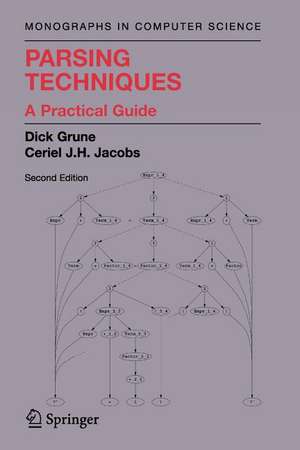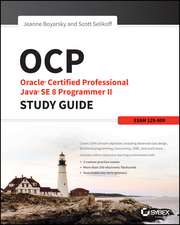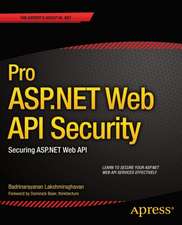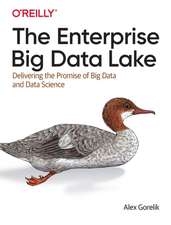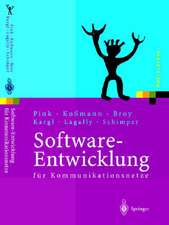Parsing Techniques: A Practical Guide: Monographs in Computer Science
Autor Dick Grune, Ceriel J. H. Jacobsen Limba Engleză Paperback – 23 noi 2010
This second edition presents new developments and discoveries that have been made in the field. Parsing techniques have grown considerably in importance, both in computational linguistics where such parsers are the only option, and computer science, where advanced compilers often use general CF parsers. Parsing techniques provide a solid basis for compiler construction and contribute to all existing software: enabling Web browsers to analyze HTML pages and PostScript printers to analyze PostScript. Some of the more advanced techniques are used in code generation in compilers and in data compression.
In linguistics, the importance of formal grammars was recognized early on, but only recently have the corresponding parsing techniques been applied. Also their importance as general pattern recognizers is slowly being acknowledged. This text Parsing Techniques explores new developments, such as generalized deterministic parsing, linear-time substring parsing, parallel parsing, parsing as intersection, non-canonical methods, and non-Chomsky systems.
To provide readers with low-threshold access to the full field of parsing techniques, this new edition uses a two-tiered structure. The basic ideas behind the dozen or so existing parsing techniques are explained in an intuitive and narrative style, and problems are presented at the conclusion of each chapter, allowing the reader to step outside the bounds of the covered material and explore parsing techniques at various levels. The reader is also provided with an extensive annotated bibliography as well as hints and partial solutions to a number of problems. In the bibliography, hundreds of realizations and improvements of parsing techniques are explained in a much terser, yet still informal, style, improving its readability and usability.
The reader should have an understanding of algorithmic thinking, especially recursion; however, knowledge of any particular programming language is not required.
| Toate formatele și edițiile | Preț | Express |
|---|---|---|
| Paperback (1) | 1462.66 lei 6-8 săpt. | |
| Springer – 23 noi 2010 | 1462.66 lei 6-8 săpt. | |
| Hardback (1) | 1322.33 lei 17-23 zile | +105.00 lei 4-10 zile |
| Springer – 30 noi 2007 | 1322.33 lei 17-23 zile | +105.00 lei 4-10 zile |
Din seria Monographs in Computer Science
- 20%
 Preț: 1322.33 lei
Preț: 1322.33 lei - 20%
 Preț: 511.92 lei
Preț: 511.92 lei - 20%
 Preț: 1285.31 lei
Preț: 1285.31 lei - 20%
 Preț: 333.22 lei
Preț: 333.22 lei - 20%
 Preț: 328.60 lei
Preț: 328.60 lei - 15%
 Preț: 646.94 lei
Preț: 646.94 lei - 20%
 Preț: 357.48 lei
Preț: 357.48 lei - 20%
 Preț: 339.47 lei
Preț: 339.47 lei - 20%
 Preț: 653.21 lei
Preț: 653.21 lei - 20%
 Preț: 329.44 lei
Preț: 329.44 lei - 20%
 Preț: 993.74 lei
Preț: 993.74 lei - 20%
 Preț: 992.26 lei
Preț: 992.26 lei - 20%
 Preț: 1630.95 lei
Preț: 1630.95 lei - 20%
 Preț: 656.03 lei
Preț: 656.03 lei - 20%
 Preț: 650.08 lei
Preț: 650.08 lei - 20%
 Preț: 328.09 lei
Preț: 328.09 lei - 20%
 Preț: 641.16 lei
Preț: 641.16 lei - 20%
 Preț: 334.38 lei
Preț: 334.38 lei - 18%
 Preț: 737.74 lei
Preț: 737.74 lei - 20%
 Preț: 642.19 lei
Preț: 642.19 lei - 20%
 Preț: 641.99 lei
Preț: 641.99 lei - 20%
 Preț: 345.59 lei
Preț: 345.59 lei - 20%
 Preț: 711.29 lei
Preț: 711.29 lei - 20%
 Preț: 1001.16 lei
Preț: 1001.16 lei - 20%
 Preț: 661.47 lei
Preț: 661.47 lei - 20%
 Preț: 343.62 lei
Preț: 343.62 lei - 20%
 Preț: 644.81 lei
Preț: 644.81 lei - 15%
 Preț: 505.30 lei
Preț: 505.30 lei - 20%
 Preț: 640.69 lei
Preț: 640.69 lei -
 Preț: 396.78 lei
Preț: 396.78 lei - 18%
 Preț: 956.81 lei
Preț: 956.81 lei - 20%
 Preț: 592.68 lei
Preț: 592.68 lei - 20%
 Preț: 329.44 lei
Preț: 329.44 lei -
 Preț: 383.33 lei
Preț: 383.33 lei - 20%
 Preț: 349.40 lei
Preț: 349.40 lei - 20%
 Preț: 832.40 lei
Preț: 832.40 lei - 20%
 Preț: 993.42 lei
Preț: 993.42 lei - 15%
 Preț: 578.87 lei
Preț: 578.87 lei - 20%
 Preț: 337.85 lei
Preț: 337.85 lei - 20%
 Preț: 988.16 lei
Preț: 988.16 lei - 20%
 Preț: 996.56 lei
Preț: 996.56 lei - 20%
 Preț: 1293.37 lei
Preț: 1293.37 lei - 20%
 Preț: 1452.94 lei
Preț: 1452.94 lei
Preț: 1462.66 lei
Preț vechi: 1828.32 lei
-20% Nou
Puncte Express: 2194
Preț estimativ în valută:
279.87€ • 292.24$ • 231.11£
279.87€ • 292.24$ • 231.11£
Carte tipărită la comandă
Livrare economică 15-29 aprilie
Preluare comenzi: 021 569.72.76
Specificații
ISBN-13: 9781441919014
ISBN-10: 1441919015
Pagini: 688
Ilustrații: XXIV, 662 p.
Dimensiuni: 155 x 235 x 36 mm
Greutate: 0.98 kg
Ediția:2nd ed. 2008
Editura: Springer
Colecția Springer
Seria Monographs in Computer Science
Locul publicării:New York, NY, United States
ISBN-10: 1441919015
Pagini: 688
Ilustrații: XXIV, 662 p.
Dimensiuni: 155 x 235 x 36 mm
Greutate: 0.98 kg
Ediția:2nd ed. 2008
Editura: Springer
Colecția Springer
Seria Monographs in Computer Science
Locul publicării:New York, NY, United States
Public țintă
ResearchCuprins
Grammars as a Generating Device.- to Parsing.- General Non-Directional Parsing.- Regular Grammars and Finite-State Automata.- General Directional Top-Down Parsing.- General Directional Bottom-Up Parsing.- Deterministic Top-Down Parsing.- Deterministic Bottom-Up Parsing.- Non-Canonical Parsers.- Generalized Deterministic Parsers.- Substring Parsing.- Parsing as Intersection.- Parallel Parsing.- Non-Chomsky Grammars and Their Parsers.- Error Handling.- Practical Parser Writing and Usage.- Annotated Bibliography.
Textul de pe ultima copertă
Parsing, also referred to as syntax analysis, has been and continues to be an essential part of computer science and linguistics. Today, parsing is also applied in other disciplines; some examples are document preparation and conversion, chemical formulae typesetting, and chromosome recognition.
In addition to the traditional parsing techniques, this second edition presents new developments and discoveries: generalized deterministic parsing, linear-time substring parsing, parallel parsing, parsing as intersection, non-canonical methods, non-Chomsky systems, and many more.
Parsing techniques provide a solid basis for compiler construction and linguistics, and contribute to all existing software: they enable Web browsers to analyze HTML pages and PostScript printers to analyze PostScript, and some of the more advanced techniques are used in code generation in compilers and in data compression. Also their importance as general pattern recognizers is slowly being acknowledged.
To provide readers with low-threshold access to the full field of parsing techniques, this book uses a two-tiered structure. The basic ideas behind the existing parsing techniques are explained in an intuitive and narrative style, starting from the first principles of data structures and algorithms; this provides breadth and accessibility. The hundreds of realizations and improvements of these basic ideas are explained in an extensive annotated bibliography, in a much terser, yet still informal style; this provides depth.
The reader should have an understanding of algorithmic thinking, especially recursion; however, knowledge of any particular programming language is not required.
In addition to the traditional parsing techniques, this second edition presents new developments and discoveries: generalized deterministic parsing, linear-time substring parsing, parallel parsing, parsing as intersection, non-canonical methods, non-Chomsky systems, and many more.
Parsing techniques provide a solid basis for compiler construction and linguistics, and contribute to all existing software: they enable Web browsers to analyze HTML pages and PostScript printers to analyze PostScript, and some of the more advanced techniques are used in code generation in compilers and in data compression. Also their importance as general pattern recognizers is slowly being acknowledged.
To provide readers with low-threshold access to the full field of parsing techniques, this book uses a two-tiered structure. The basic ideas behind the existing parsing techniques are explained in an intuitive and narrative style, starting from the first principles of data structures and algorithms; this provides breadth and accessibility. The hundreds of realizations and improvements of these basic ideas are explained in an extensive annotated bibliography, in a much terser, yet still informal style; this provides depth.
The reader should have an understanding of algorithmic thinking, especially recursion; however, knowledge of any particular programming language is not required.
Caracteristici
Accessible, yet comprehensive introduction to parsing techniques helps readers to quickly gain a broad understanding of subject Summarizes more than 700 papers referenced in the book, saving readers countless hours Many exercises include hints and partial solutions, making it ideal for self-study or classroom use Extensive bibliography, and annotated bibliography on website, help interested readers to find more information Includes supplementary material: sn.pub/extras
